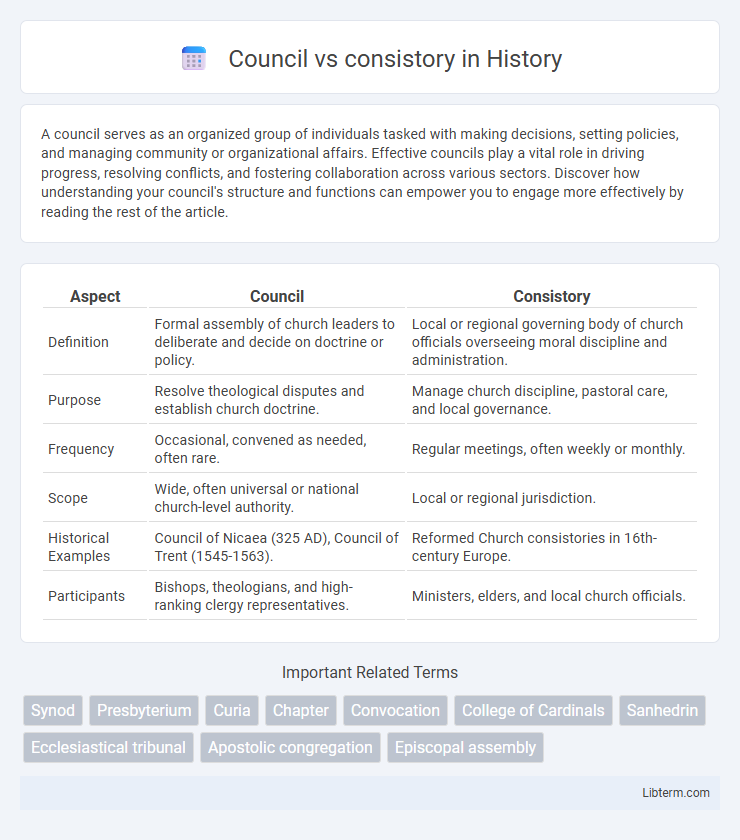A council serves as an organized group of individuals tasked with making decisions, setting policies, and managing community or organizational affairs. Effective councils play a vital role in driving progress, resolving conflicts, and fostering collaboration across various sectors. Discover how understanding your council's structure and functions can empower you to engage more effectively by reading the rest of the article.
Table of Comparison
| Aspect | Council | Consistory |
|---|---|---|
| Definition | Formal assembly of church leaders to deliberate and decide on doctrine or policy. | Local or regional governing body of church officials overseeing moral discipline and administration. |
| Purpose | Resolve theological disputes and establish church doctrine. | Manage church discipline, pastoral care, and local governance. |
| Frequency | Occasional, convened as needed, often rare. | Regular meetings, often weekly or monthly. |
| Scope | Wide, often universal or national church-level authority. | Local or regional jurisdiction. |
| Historical Examples | Council of Nicaea (325 AD), Council of Trent (1545-1563). | Reformed Church consistories in 16th-century Europe. |
| Participants | Bishops, theologians, and high-ranking clergy representatives. | Ministers, elders, and local church officials. |
Understanding "Council" and "Consistory": Key Definitions
A council is a formal assembly of representatives or officials convened to deliberate, make decisions, or govern an organization, often within political, religious, or corporate contexts. A consistory specifically refers to a governing body or court in certain religious institutions, particularly within the Catholic Church, responsible for advising the pope or overseeing church administration. Understanding the distinction highlights that councils are broader decision-making entities, while consistories have a more specialized, ecclesiastical function.
Historical Origins of Councils and Consistories
Councils originated in early Christianity as formal gatherings of bishops to resolve doctrinal disputes and establish church canons, exemplified by the First Council of Nicaea in 325 AD. Consistories trace back to the Roman Catholic Church, where they developed as informal or formal meetings of the pope with cardinals, initially serving as advisory bodies during the Middle Ages. The historical evolution of councils reflects broad, ecumenical decision-making processes, whereas consistories traditionally functioned within the hierarchical structure of the papal administration.
Structural Differences: Council vs Consistory
A council is typically a larger, formal assembly composed of representatives from various regions or groups within a church or organization, convening to discuss doctrine, policy, or governance at a broad level. A consistory functions as a smaller, local governing body, often at the diocesan or congregational level, responsible for overseeing day-to-day church administration and discipline. Structurally, councils are periodic and issue-wide decision-making bodies, whereas consistories operate continuously as executive or judicial units within a specific jurisdiction.
Functions and Roles in Religious Governance
A council in religious governance typically serves as a decision-making body that addresses doctrinal, administrative, and disciplinary matters, often involving representatives from various regions or denominations to establish unified policies. A consistory functions primarily within specific church traditions, acting as a governing tribunal responsible for local church discipline, moral oversight, and the supervision of clergy conduct. While councils have broader authority in defining theological directions and church-wide regulations, consistories focus on maintaining order and governance at the regional or congregational level.
Notable Councils in History
Notable councils in history, such as the Council of Nicaea (325 AD) and the Council of Chalcedon (451 AD), played a crucial role in defining Christian doctrine and addressing heresies within the early Church. Unlike a consistory, which is typically a governing body or advisory assembly within specific Christian denominations, councils often convened broader representation from bishops across regions to deliberate on theological, liturgical, and organizational matters. The outcomes of these councils, including creeds and canons, have had lasting impacts on Christian theology and ecclesiastical law.
Significant Consistories and Their Impact
Significant consistories, such as the 1545 consistory under Pope Paul III, played a crucial role in shaping Church doctrine during the Counter-Reformation by approving key reforms and canonizations. These consistories directly influenced the Council of Trent's decrees by formalizing decisions on disciplinary measures and ecclesiastical appointments. Their impact extended to reinforcing papal authority and clarifying Church teachings, which contrasted with the broader deliberative nature of ecumenical councils.
Decision-Making Processes: Comparing Councils and Consistories
Councils involve collective decision-making with representatives from various regions or groups, ensuring broad consensus and diverse input. Consistories, on the other hand, are more centralized, typically comprising clergy or church officials who make administrative and judicial decisions within a specific ecclesiastical jurisdiction. The council system emphasizes deliberation and inclusivity, while consistories prioritize efficiency and hierarchical authority in resolving church matters.
Influence on Church Doctrine and Policy
Councils, such as ecumenical and general councils, wield significant authority in defining and shaping Church doctrine through formal declarations and creeds that address widespread theological controversies. Consistories, typically smaller gatherings of church officials, primarily influence internal governance and disciplinary policies rather than broad doctrinal formulations. The impact of councils extends beyond immediate church governance, setting foundational dogmas that guide ecclesiastical policy and practice across denominations.
Council vs Consistory: Pros and Cons
Councils typically involve broader representation and can address complex theological or organizational issues with diverse perspectives, fostering widespread consensus but potentially leading to slower decision-making processes. Consistories, often more localized and smaller bodies, offer efficient governance and quicker resolutions, ideal for managing community-specific matters but may lack comprehensive input or broader applicability. The choice between council and consistory hinges on balancing inclusivity and deliberation against efficiency and focused authority within ecclesiastical or organizational structures.
Modern Relevance in Religious Institutions
Councils remain vital in modern religious institutions as they aid in decision-making processes that shape doctrines, policies, and community outreach efforts, ensuring adaptability in contemporary societal contexts. Consistories, often serving as governing bodies within specific denominations like the Reformed churches, maintain administrative control and uphold disciplinary measures, reinforcing organizational structure and accountability. Both entities contribute uniquely to sustaining religious traditions while addressing modern challenges such as inclusivity, ethical governance, and interfaith dialogue.
Council Infographic

 libterm.com
libterm.com